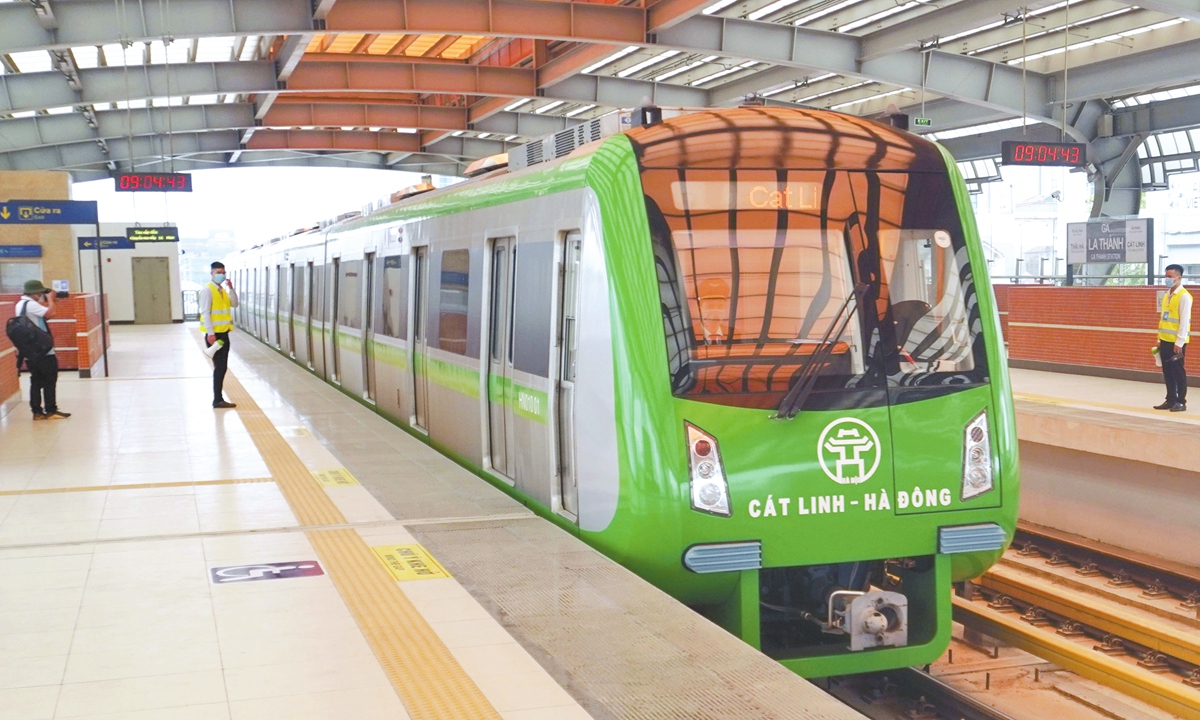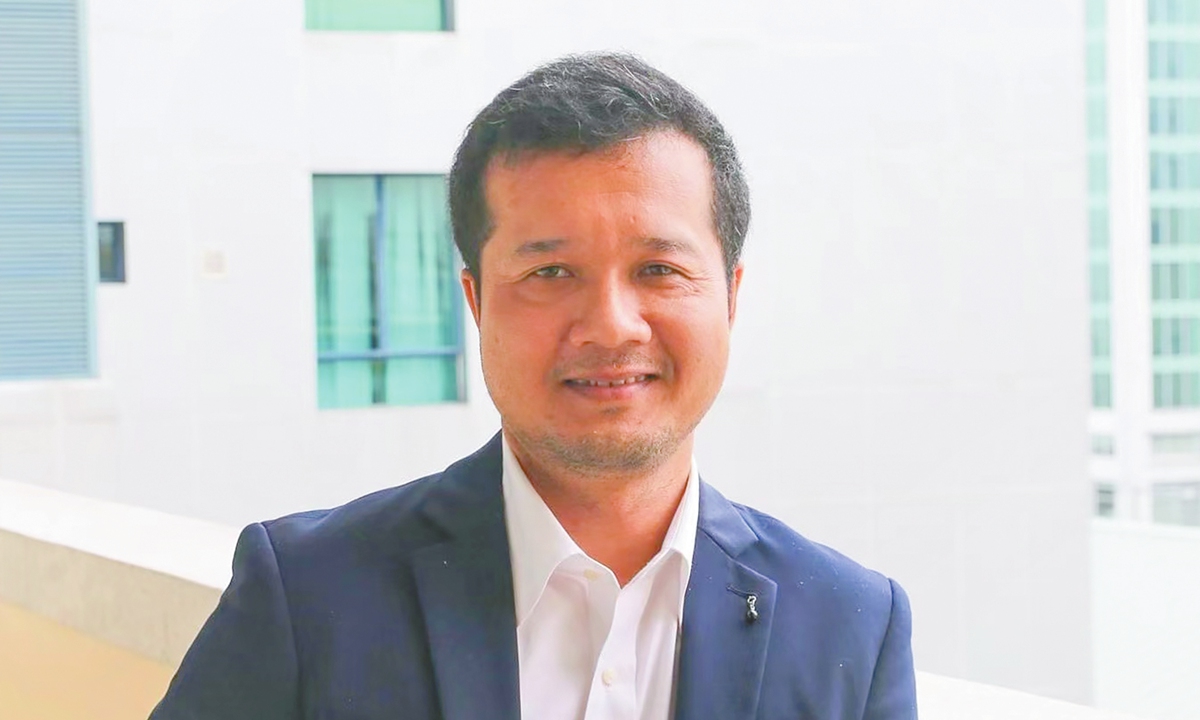
The view of the Cat Linh-Ha Dong metro line constructed by a Chinese company in Hanoi, Vietnam. Photo: VCG
Editor's Note:
General Secretary of the Communist Party of China Central Committee and Chinese President Xi Jinping is paying a state visit to Vietnam from Monday to Tuesday, followed by visits to two other Southeast Asian countries Malaysia and Cambodia. The visits are President Xi's first overseas trips this year and hold significant importance for China's relations with these three countries and ASEAN as a whole. Just last week, Xi called for building a community with a shared future with neighboring countries and striving to open new ground for China's neighborhood work at a central conference on work related to neighboring countries held in Beijing. In an interview with Global Times (GT) reporters Wang Wenwen and Xing Xiaojing, Nguyen Tang Nghi (Nghi), dean of the School of International Relations, University of Social Sciences & Humanities under the Vietnam National University Ho Chi Minh City, shared his opinion on the significance of President Xi's visit to Vietnam and China's neighborhood diplomacy.
GT: What features of China's neighborhood diplomacy can be observed in President Xi's ongoing overseas visits?
Nghi: Xi's first overseas trips in 2025 include stops in Vietnam, Malaysia and Cambodia. China, which shares borders with 14 countries, is building its neighborhood diplomatic strategy and policy on principles that the Chinese government has emphasized: amity, sincerity, mutual benefit and inclusiveness. In line with these principles, China has prioritized maintaining and developing multifaceted relations with Southeast Asian countries in recent years. This region is considered crucial in the geopolitical and economic landscape, especially given the strategic competition between the US and China and current shifts in the regional security structure. This itinerary demonstrates China's clear determination to comprehensively and seriously implement its neighborhood diplomacy throughout the region.
GT: The last time Xi visited Vietnam was nearly a year and a half ago. Do you think China-Vietnam ties serve as a model for China's neighborhood diplomacy? China-Vietnam relations are often described as "comrades and brothers." How can Xi's visit this time elevate bilateral ties and enhance cooperation?
Nghi: There have always been mutual official visits between high-ranking leaders of the two countries, highlighting the importance both nations place on their special diplomatic ties. Xi's visit to Vietnam, along with the selection of Vietnam as the first country on his overseas trips, serves as a clear demonstration of these diplomatic relations. Vietnam and China's diplomatic relations are built on the motto: "friendly neighborliness, comprehensive cooperation, long-term stability, looking toward the future" and the spirit of "good neighbors, good friends, good comrades, good partners."
Over the past 75 years, the two countries have continuously consolidated, strengthened and upgraded their relationship in all aspects. Vietnam and China have a long-standing traditional friendship and cultural similarities, with their people supporting and helping each other in the cause of revolutionary struggle and socialist construction. Economic and trade relations are a vivid example of the comprehensive "comrade and brother" relationship. For many years, Vietnam has been China's largest trading partner in ASEAN, and by 2024, it had become China's fourth-largest trading partner globally. At the same time, China is Vietnam's largest trading partner, largest import market, and second-largest export market.

Nguyen Tang Nghi Photo: Courtesy of Nghi
GT: Facing increasing pressure from certain countries to pick a side, many Southeast Asian nations, including Vietnam, have expressed their unwillingness to choose between China and the US. How should Southeast Asian countries and China further collaborate to build the ASEAN region into an area for international cooperation and avoid it becoming a battleground for great power competition?
Nghi: As mentioned, Southeast Asia is currently a hotspot for strategic competition among global powers. In particular, China-US competition has become increasingly intense and acute. Therefore, it is understandable that countries in the region are being drawn into this competition. However, how regional nations can balance this competition is a difficult problem - and a subject of much current attention. This is especially true given that both the US and China have political, economic and cultural roles and influence in the region. Therefore, Southeast Asian countries need to leverage the advantages and strengths of both powers to promote their own development.
In my opinion, Southeast Asian countries should increase interaction and trade relations with major powers like the US and China, which will help them form and discover their own identities. Once they establish their own identities, they will naturally be able to work together and share with each other. In this case, Vietnam is implementing this theoretical perspective relatively clearly and specifically: Vietnam does not choose sides; Vietnam only chooses justice.
GT: China's neighborhood diplomacy emphasizes the concept of a community with a shared future with neighboring countries. What is your understanding of this concept, especially in relation to China-ASEAN relations?
Nghi: The community with a shared future with neighboring countries is a key policy of China, aimed at building a harmonious society where countries in the region share interests and support one another. The pursuit of mutual benefits, sharing, and supporting each other's responsibilities is something that many countries want to achieve.
China and ASEAN are geographically close and share cultural and social similarities. Therefore, compared to other regions, China and ASEAN have distinct advantages in implementing this strategy. For example, China's strong implementation of the Belt and Road Initiative, particularly through the development of an overland transportation system, shows that China and ASEAN can create an economic and trade community. This will serve as an important foundation for promoting and forming a prosperous society in Southeast Asia. This is one manifestation of the concept of a China-ASEAN community with a shared future.
GT: At present, the tariff war initiated by the US administration is bringing the world economy - and even the globalized world order - into an uncertain zone. What do you think of the abuse of tariffs by the US? How can China and Vietnam, as well as China and the region, collaborate to navigate these currents?
Nghi: In recent days, the trade war, with tariffs as its "weapons," initiated by the US, has continued to escalate. This will create uncertainty in the traditional landscape of globalization and trade cooperation.
Vietnam, China and other countries in the Southeast Asian region may face similar challenges - all being "victims" of the tariff war launched by the US. Therefore, we need to further open our economies and strengthen mutual trade and investment cooperation. Vietnam and China, in particular, need to be more proactive and decisive in promoting trade and investment, leveraging each other's strengths as the tariff war becomes more intense and unpredictable.
By doing so, we can work together to navigate the trend of tariffs in a direction that benefits China, Vietnam and ASEAN. Based on this, I believe that a community with a shared future between China and ASEAN may emerge.





